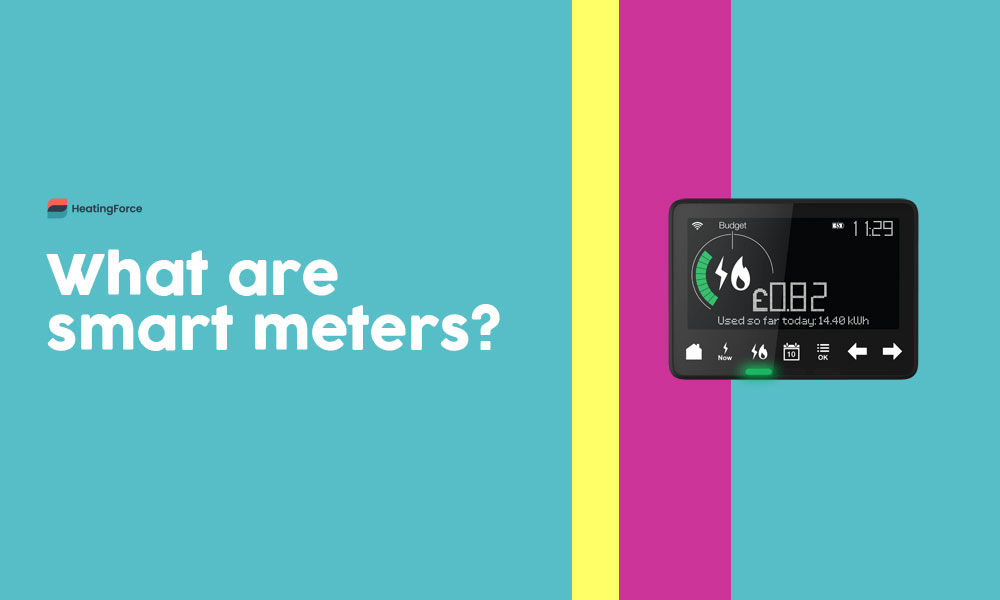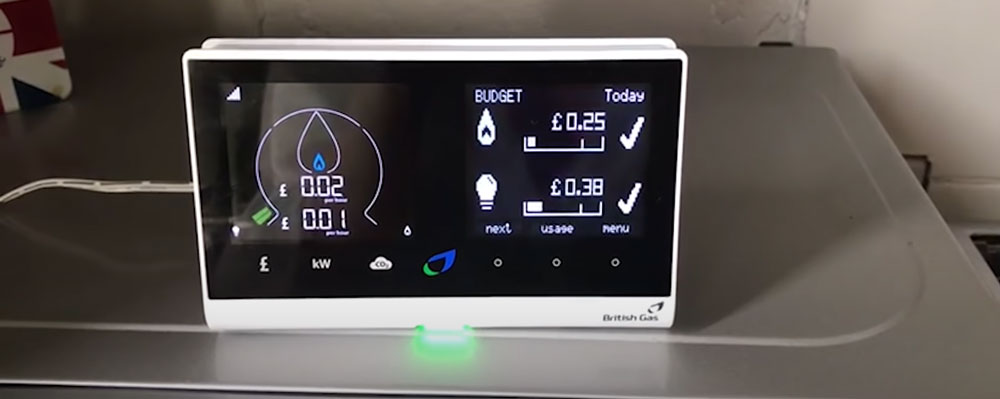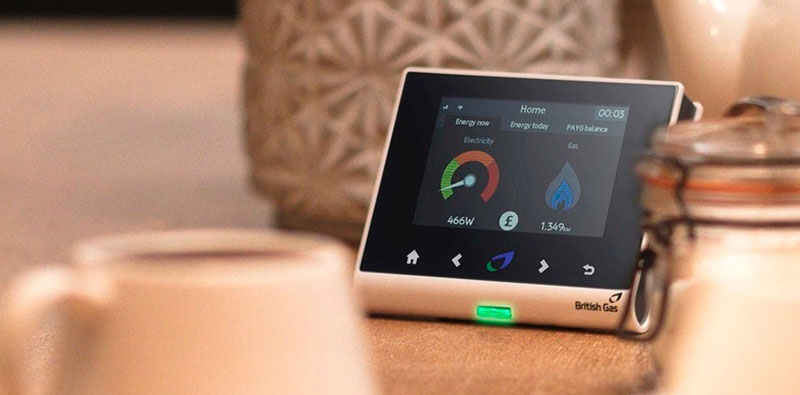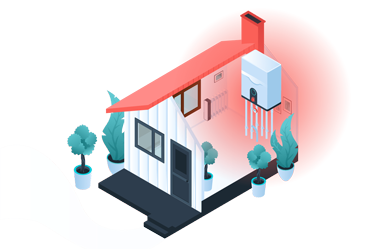Smart Meters Explained: What You Need to Know About UK’s Next Gen Energy Metering
Widely used across continental Europe and North America, smart meters are still in the rollout stage here in the UK. Of the 25 million dwellings in the nation, 15.3 million, or 61%, have embraced the new technology. That’s still a bit far from the Government’s 2024 goal of 85%. Which is why, between now and 2024, you may find your energy supplier knocking on the door with a smart meter upgrade.

To help you decide whether a smart meter is the right choice for you, we’ve put together this helpful guide. To explore smart meter basics and how they may affect your life, read on.
What is a smart meter?
Smart meters are meant to replace their standard counterparts. With the latter, you rely on estimated bills and submit your readings manually, or have a guy come round to take them; smart meters, on the other hand, send your usage data right to the supplier. This way, you get accurate bills that reflect what you’ve used.
And there’s another novel feature. When you install a smart meter, you also get a portable in-home display that shows your usage and costs in real-time pounds and pence.
How do smart meters work?
Smart meters track and record your energy usage. Then, they send this data to the supplier wirelessly over a network run by SmartDCC. This ability to convey your readings, while showing you real-time billing info is what makes these meters ‘smart’.
Now, you may rightly wonder who these SmartDCC people are – after all, they’ll be handling your usage and billing information. You’d probably want to know your that privacy is in expert hands, and your bills won’t get cocked-up.
Well, they seem credible. The company’s mandate, straight from the Department of Business, Energy, and Industrial Strategy, is to link smart meters to all suppliers, network operators, and authorised service providers. Their connection is secure enough to be endorsed by the National Cyber Security Centre.
Will a smart meter save me money?
A smart meter does not control your usage, nor determine your unit rate per kWh (though some suppliers may offer low introductory tariffs to get you switching to a smart meter).
That said, smart meters can help you change your energy usage patterns. Their in-home display shows how much you spend on gas and electricity each day, in pounds and pence. When you’re aware of how much your daily activities cost, you may feel spurred to change your habits to save a little more.
How to read a smart meter?
Typically, there is no need for you to take readings. That’s the point of smart meters. But if your meter goes dumb, you will need to check your readings manually.

You may wonder now – why would my meter go dumb?
The most common scenario is if you switch suppliers (more on this later). In some cases, your smart meter may stop working correctly, and you’ll be stuck with a fancy-looking standard meter.
If this happens, you should be able to find the ‘meter reading’ option in the menu of your in-home display. If you can’t, you may have to look at the meter itself, and get in-depth instruction from the supplier, should the reading not appear obvious.
But there are other things your smart meter can show you. As we’ve mentioned already, these devices let you track your usage, and present a range of data on the in-home display screen. While the in-home displays may differ a bit between suppliers, they all show at least the following:
- time
- battery status
- fuel view, showing gas and electricity
- daily, real-time consumption in kWh, as well as pounds and pence
You’ll have menu options that let you see how much energy you’ve used in the week or month, what the tariff costs, alerts from the supplier, and account info.
Crucially, you will be able to set a daily budget and track your usage against this value. When you’ve gone over your budget, the in-home display will warn you with a light indicator. Again, these functions may vary from one supplier to another, but you should get a handy instructions booklet to walk you through all the bells and whistles. And since you’ll have the supplier’s technician hooking the gadget up for a few hours, be sure to ask them all the questions you can think of, because you may never see that chap again.
Do I have to have a smart meter?
At the time of writing, there’s no law on the books compelling you to get a smart meter. That said, the Government badly wants you to get on board. They were about to force you into it by 2020 but then reneged on the programme. Now, they plan to have 85% of the nation’s homes with smart meters by 2024. With this goal in mind, the powers that be are putting lots of pressure on energy suppliers to offer you these gadgets.
So you can keep your standard meter as long as you like, but you should see an upgrade offer soon, if you haven’t already.
How do I get a smart meter?
Unless you’ve been offered one already, you must check with your supplier. The ‘Big 6’ have been providing smart meters for some time, but they can’t just hand them out to everyone. For the time being, they prioritise customers where a smart meter is easy to install.
Some smaller suppliers work with smart meters, too. Green Network Energy, Green, Neo, and others will upgrade you at no charge. Speak with your supplier to see if you qualify for the switch. Again, with the 2024 deadline fast approaching, you’ll probably have one offered shortly, anyway.
Do I have to pay to get a smart meter?
Nope. Your supplier won’t charge you an extra penny to install one. You’re already paying for the smart meter rollout in your energy bill.
Can I switch my energy supplier if I have a smart meter?
Switching suppliers is a great way to stay abreast of the energy market. But if you have a smart meter, switching can get complicated.
With the first-generation smart meters or SMETS1, your meter may go dumb after such a switch. What that means is your device will no longer send readings to the supplier, and you’ll be taking manual readings like before. What’s more, it’ll stop showing your usage in pounds and pence, as it won’t be programmed with the correct tariff. That said, you’ll still see how many kilowatt-hours you’re using. To find out if your smart meter will stay smart after a switch, contact the new supplier and ask.
Keep in mind, too, that switching can save you hundreds of quid per year, so don’t let a dumb doodah hold you back. Check out how much an auto-switcher like Switchd can help you save with a better energy tariff here.
If you’ve got the second-generation meter, the SMETS2, switching should not affect your meter’s smarts. These newer models are designed to operate on the DCC and are compatible with all suppliers. One thing though – not all companies will support smart metering with prepayment or a time-of-use tariff, like Economy 7.
One last thing to keep in mind: while SMETS2 meters should be widely available by now, some suppliers may still be getting rid of their SMETS1 stock, so beware.
This brings us to our next question:
Do smart meters work with prepayment tariffs and Economy 7?
Whilst they’re not as popular as fixed or standard direct debit tariffs, prepayment and Economy 7 tariffs enjoy enough demand that some major suppliers still sell them. With smart meters, though, your pool of options slightly narrows.
That said, some companies do offer these. If you get an Economy 7 tariff, your meter will keep its smart functionality, while giving separate readings for night-time and peak hours. With a prepayment smart meter, you’ll get a handy mobile app to help you track your balance and top up remotely.
If either of these tariffs sounds right to you, and you also want to upgrade to a smart meter, let Switchd find the right supplier for your needs.
Are smart meters safe?
Safety is an obvious factor to consider when you’re dealing with a novel technology that emits radio waves. Privacy is another point of contention; after all, how hard can it be to hack one of these things and commit identity fraud?

It’s not a big surprise then that the anti-smart meter movement has rallied around both health and privacy in its bid to discredit these devices. And it’s tough to argue with their claims. We don’t know 100% that wireless technology is 100% safe. It hasn’t been around long enough for us to understand its long-term health risks. Even in its endorsement of smart meters, Public Health England says, verbatim:
“The evidence to date suggests exposures to the radio waves produced by smart meters do not pose a risk to health.”
Sorry, but ‘to date’ and ‘suggests’ aren’t terms that convey 100% assurance, especially if you’ve got loved ones to worry about.
The agency goes on:
“HPA will be carrying out research to assess exposures from the devices as the technology is rolled out.”
So, they’ve yet to assess the exposure levels and their risks.
Now let’s talk privacy. In the past 2 short decades, billions of people have had their data stolen online. Just recall Yahoo’s little blunder that left 3 billion accounts hacked in 2013. Or here’s a fresh example: only a few months before this article was written, Weibo suffered a breach that revealed the full identities of 500 million users. It’s mad to think that wireless data security is ironclad.
Whether you give credence to these concerns or dismiss them, one fact remains: we’ve already got wireless devices in our homes. Tonnes and tonnes of them. Smartphones, smart TVs, smart lights, smart windows, smart thermostats. So why not smart meters? All this other junk fills our homes with radio waves to the brim while sending our most private data just like smart meters do.
Of course, we’ll leave you to conclude whether smart meters are safe or not. If you trust the Government – they’re harmless, and your privacy is in good hands. If you don’t take their word for it, remember: at the moment, no one’s forcing you to get a smart meter.
As we wrap up this post, let’s review the pros and cons of smart meters.
What are the pros of smart meters?
- Smart meters track and record your readings, then transmit them to the supplier. You don’t have to lift a finger to send the readings, nor should you ever have a stranger poking around your home. If you’re on a prepayment meter, you can view your balance and top up via the mobile app.
- Precise billing. Your bills will be more accurate since the supplier will base them on actual readings.
- Usage tracking. These devices come with a portable, in-home display. This gadget lets you monitor your usage in kWh, and track how much you’re spending in real-time, in pounds and pence. The in-home display also allows you to set your spending cap and track your usage against this budget.
- Easy access to your account. With the in-home display, you have access to your tariff information for both fuels and can view messages and alerts from the supplier.
- Quite a few suppliers work with smart meters. Some of these can facilitate smart metering with prepayment and time-of-use tariffs.
- No extra costs. Smart meters won’t cost you a single extra penny.
What are the cons of smart meters?
- Loss of ‘smart’ function. The older version, SMETS1, is notorious for going dumb when you switch suppliers. So if you switched, and the device stopped sending data, you’d be back to the old routine of estimated billing and manual readings. Consequently, you may be tempted to hold back from making a favourable switch just to protect your meter’s smart functionality. Failing to switch suppliers will inevitably keep your energy bills higher than they can be; click here, and in 60 seconds, you’ll see how much you can save on your bills by switching.
- While they’re readily available for most, some suppliers can’t install smart meters in specific locations just yet. So for the time being, you may not have access to this gadget if you wish to upgrade.
- Fewer tariff options. Depending on the supplier, prepayment and Economy 7 tariffs may not be compatible with smart meters.
- Health concerns. Based on smart meter use in other countries, the public health agency is not aware of any health risks posed by these devices. That said, the exposure is yet to be researched here in the UK as the rollout happens.
- Privacy concerns. As anti-smart meter activists claim, sending private data over radio waves is just an invitation for hackers and identity theft.
Final thoughts
It’s safe to say that the vast majority of the UK’s homes will be equipped with smart meters within the next decade. While the Government has scaled back their ambitious drive to get the entire country onboard by, well, now, it’s still got its mind set on these devices. So, you’ll probably get a smart meter offer soon, possibly with a cheap tariff to sweeten the deal.
If you install a smart meter, you can say goodbye to estimated billing and taking manual readings. You’ll also have a great new way of tracking your energy habits and seeing their financial consequences.
On the downside, you’d be getting one more device to create radio signals inside your home, and another channel for sending your private data.
One last thing. If you do want a smart meter, do your best to get your hands on the SMETS2. Unlike their older counterparts, these new generation meters are compatible with all suppliers so that you can switch to your heart’s content. Swtichd can help you find the best deals on the market that will work with your smart meter.
Did we miss anything? If you have experience with a smart meter, or switching suppliers, and would like to share it with our readers and us, please leave a comment below!
